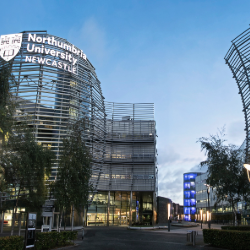-
Study
-
Quick Links
- Open Days & Events
- Unlock Your Potential
- Tuition Fees, Funding & Scholarships
- Open Day 25th October
-
Undergraduate
- Application Guides
- UCAS Exhibitions
- Extended Degrees
- School & College Outreach
- Information for Parents
-
Postgraduate
- Application Guide
- Postgraduate Research Degrees
- Flexible Learning
- Change Direction
- Register your Interest
-
Student Life
- Students' Union
- The Hub - Student Blog
- Accommodation
- Northumbria Sport
- Support for Students
-
Learning Experience
- Real-World Learning
- Research-enriched learning
- Graduate Futures
- The Business Clinic
- Study Abroad
-
-
International
International
Northumbria’s global footprint touches every continent across the world, through our global partnerships across 17 institutions in 10 countries, to our 277,000 strong alumni community and 150 recruitment partners – we prepare our students for the challenges of tomorrow. Discover more about how to join Northumbria’s global family or our partnerships.
View our Global Footprint-
Quick Links
- Course Search
- Undergraduate Study
- Postgraduate Study
- Information for Parents
- London Campus
- Northumbria Pathway
- Cost of Living
- Sign up for Information
-
International Students
- Information for International Students
- International Events
- Application Guide
- Entry Requirements and Education Country Agents
- Global Offices
- English Requirements
- English Language Centre
- International student support
- Cost of Living
-
International Fees and Funding
- International Undergraduate Fees
- International Undergraduate Funding
- International Masters Fees
- International Masters Funding
- International Postgraduate Research Fees
- International Postgraduate Research Funding
-
International Partners
- Agent and Representatives Network
- Global Partnerships
- Global Community
-
International Mobility
- Study Abroad
- Information for Incoming Exchange Students
-
-
Business
Business
The world is changing faster than ever before. The future is there to be won by organisations who find ways to turn today's possibilities into tomorrows competitive edge. In a connected world, collaboration can be the key to success.
More on our Business Services -
Research
Research
Northumbria is a research-rich, business-focused, professional university with a global reputation for academic quality. We conduct ground-breaking research that is responsive to the science & technology, health & well being, economic and social and arts & cultural needs for the communities
Discover more about our Research-
Quick Links
- Research Peaks of Excellence
- Academic Departments
- Research Staff
- Postgraduate Research Studentships
- Research Events
-
Research at Northumbria
- Interdisciplinary Research Themes
- Research Impact
- REF
- Partners and Collaborators
-
Support for Researchers
- Research and Innovation Services Staff
- Researcher Development and Training
- Ethics, Integrity, and Trusted Research
- University Library
- Vice Chancellors Fellows
-
Research Degrees
- Postgraduate Research Overview
- Doctoral Training Partnerships and Centres
- Academic Departments
-
Research Culture
- Research Culture
- Research Culture Action Plan
- Concordats and Commitments
-
-
About Us
-
About Northumbria
- Our Strategy
- Our Staff
- Our Schools
- Place and Partnerships
- Leadership & Governance
- University Services
- Northumbria History
- Contact us
- Online Shop
-
-
Alumni
Alumni
Northumbria University is renowned for the calibre of its business-ready graduates. Our alumni network has over 250,000 graduates based in 178 countries worldwide in a range of sectors, our alumni are making a real impact on the world.
Our Alumni - Work For Us
What will I learn on this module?
This module will open your ears to a wide range of repertoire from the Middle Ages to the eighteenth century with a primary focus on Western art music. The notions of ‘Classical’ or ‘Western Art Music’ are problematic, not least because they encompass music composed over more than a millennium. You will be exposed to a broad range of music, much of which will be new to you. In part one of Millennium of Music you will explore some of the principal musical developments from about 900 AD to the eighteenth century, looking at how music was created and preserved through notation, and how its techniques, styles and theoretical underpinnings differ from music today. Although much of the repertoire you will be studying is now heard in concert hall and recital, you will discover the contexts for which it was originally intended, and the function that it played in society at large. This module will give you a clear and broad grasp of the shape of musical, cultural and intellectual history alongside more detailed studies of individual pieces whilst engaging with questions of how histories of music are constructed. You will gain a framework into which you will be able to relate more detailed and specialist studies of music, and develop your skills and confidence in reading critically, writing about and analysing music from a historical perspective.
How will I learn on this module?
During the module you will be given guided reading and listening each week which will give you an overview of a particular topic.
Lectures will provide an introduction to each topic and give you practice in listening skills, developing a facility for absorbing information delivered orally. Seminars will provide a flexible time for student presentations, group work and discussion. You will be given individual advice on your essay in a short tutorial, and the opportunity to receive oral feedback on your written work.
How will I be supported academically on this module?
Your academic development will be supported through engagement with your peers, academic tutors, and programme leaders. Academic support is provided through seminar discussions and optional essay tutorials which allow specific issues to be addressed and to promote progress in academic development. The module tutor will be accessible within publicised office hours and via email. Your peers will provide you will a collaborative learning environment, and your programme leader will guide you through the requirements and expectations of your course. You will also be supported through individual engagement with the academic literature, lectures, and resources available on the eLearning Portal. Formative feedback will be on-going throughout seminar activities and through a formative draft essay plan in preparation for the first summative essay.
What will I be expected to read on this module?
All modules at Northumbria include a range of reading materials that students are expected to engage with. Online reading lists (provided after enrolment) give you access to your reading material for your modules. The Library works in partnership with your module tutors to ensure you have access to the material that you need.
What will I be expected to achieve?
Knowledge & Understanding:
1. You will demonstrate knowledge of a wide repertoire of music from different periods, an understanding of some of the main stylistic developments and an awareness of the function played by music in various contexts.
Intellectual / Professional skills & abilities:
2. You will be able to make effective use of written and aural sources of information in the construction of an argument, making appropriate acknowledgement of them.
Personal Values Attributes (Global / Cultural awareness, Ethics, Curiosity) (PVA):
3. You will demonstrate curiosity through an open-minded engagement with unfamiliar musical sounds, concepts, repertoires and practices.
4. You will demonstrate a capacity to monitor and assess your own progress and an ability to respond positively to feedback of others.
5. You will demonstrate an ability to manage your time, and to work effectively with others and on your own.
How will I be assessed?
1. FORMATIVE: you will submit a draft essay plan and indicative bibliography in preparation for your first summative assessment
2. Participation in weekly learning tasks (10%): Short assignments that will vary by topic and may include quizzes, contributions to wikis or discussions, short text submissions, reflective listening responses, or pre/post reading circle notes. Feedback will depend on the individual assignments, and may include quiz scores, brief written feedback, oral feedback to cohort, or a combination of these. MLO 1, 2, 3, 4, 5.
3. Essay 1 of 2,000 words (40%), submitted in the middle of Semester 1. A 2000-word essay that tests students’ ability to make use of what they have learned in lectures and seminars, and to undertake their own research on a topic. MLO 1, 2, 3, 4, 5.
4. Essay 2 of 2,000 words (50%), submitted at end of Semester 1. A 2000-word essay that tests students’ ability to make use of what they have learned in lectures and seminars, and to undertake their own research on a topic. MLO 1, 2, 3, 4, 5
Feedback on essays comprises annotations to the script and a short report, plus an opportunity to disuss your work in an individual tutorial.
Pre-requisite(s)
N/A
Co-requisite(s)
N/A
Module abstract
This module will open your ears to a vast range of music from the Middle Ages to the eighteenth century, much of which will be new to you. We will look at how music was created and preserved through notation, and how its styles, techniques and theoretical underpinnings changed over time. Although you may think of this music as belonging to the concert hall, you will discover the contexts for which it was originally intended, and the functions that it played in society at large. In conjunction with Millennium of Music (Part II), this module is intended to give you a broad knowledge of music history as a framework into which you will be able to slot more specialist studies later in the degree and to develop your skills and confidence in writing about and analysing music from a historical perspective.
Course info
UCAS Code W320
Credits 20
Level of Study Undergraduate
Mode of Study 3 years Full Time or 4 years with a placement (sandwich)/study abroad
School Humanities and Social Sciences
Location City Campus, Northumbria University
City Newcastle
Start September 2026
All information is accurate at the time of sharing.
Full time Courses are primarily delivered via on-campus face to face learning but could include elements of online learning. Most courses run as planned and as promoted on our website and via our marketing materials, but if there are any substantial changes (as determined by the Competition and Markets Authority) to a course or there is the potential that course may be withdrawn, we will notify all affected applicants as soon as possible with advice and guidance regarding their options. It is also important to be aware that optional modules listed on course pages may be subject to change depending on uptake numbers each year.
Contact time is subject to increase or decrease in line with possible restrictions imposed by the government or the University in the interest of maintaining the health and safety and wellbeing of students, staff, and visitors if this is deemed necessary in future.
Useful Links
Find out about our distinctive approach at
www.northumbria.ac.uk/exp
Admissions Terms and Conditions
northumbria.ac.uk/terms
Fees and Funding
northumbria.ac.uk/fees
Admissions Policy
northumbria.ac.uk/adpolicy
Admissions Complaints Policy
northumbria.ac.uk/complaints









